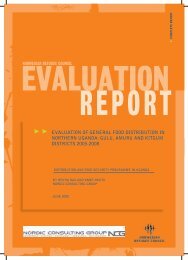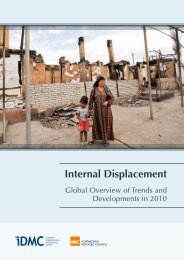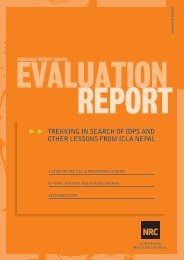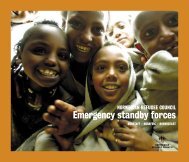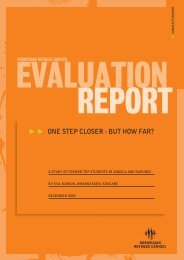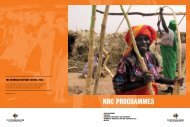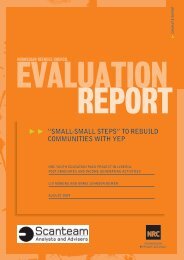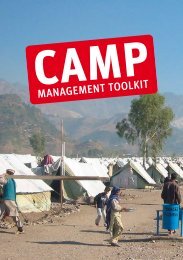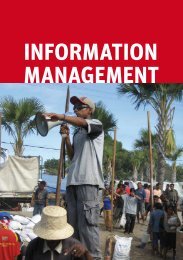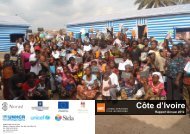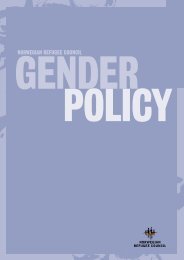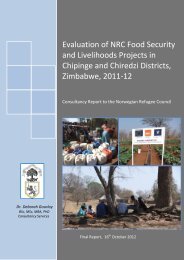Download report here - Norwegian Refugee Council
Download report here - Norwegian Refugee Council
Download report here - Norwegian Refugee Council
- No tags were found...
You also want an ePaper? Increase the reach of your titles
YUMPU automatically turns print PDFs into web optimized ePapers that Google loves.
of the performance of the SBT team. Some informal discussions were conductedwith personalities and individuals who are not direct stakeholders of the SBTproject but who have a good understanding of the UN mediation activities.Context analysis: We were aware that the overall policy and institutional contextin which the MSU and the MSU SBT operates is very important and needed to beproperly reflected. This helped us to suggest realistic recommendations forspecific challenges related to the provision and organisation of mediation support.Regular feedback: We had the opportunity to have a wider range of discussionswith the NRC and the UN and to check with them on a number of criticalquestions.Time table/Work planIn the presentation of this work plan t<strong>here</strong> are two main changes which need to beconsidered.- Due to a mediation deployment to the Maldives (MSU/BCPR) of Antje Herrberg, theevaluation started later than originally foreseen.- We did not undertake field trips as originally foreseen but spent one week in New Yorkwhich allowed us to make full use of feedback from the MSU, the DPA and thebeneficiaries of the mediation support services through the Standby Team. T<strong>here</strong>ason was that we considered that most of the processes are in fact on-going andhighly paced w<strong>here</strong> mediators and their teams find it difficult to spend time oninterviews. Secondly, the time and resources which we had at our disposal did notallow us to spend sufficient time in the field for a representative sample. Finally, itseems to us that the most valuable information was within the Mediation SupportUnit, the mediation focal points of the UNDPA s regional divisions, the Envoys andSpecial Representatives and other agencies which have requested the services of theSBT. We had no opportunity to speak to envoys or SRSG s but had an opportunity tomeet the USG for Political Affairs, Mr Lynn Pascoe.Phase I: Desk Research [Duration: 19.9. 22.9.2010]Following the signature of the evaluation contract, the evaluation team obtained access tomost project-related documents (end of mission <strong>report</strong>s, notes and project <strong>report</strong>s) whichwere (and continue to be) studied in an intensive period of desk research. The desk researchhelped to modify evaluation criteria and interview questions. In this phase, some discussionsand telephone conversations with a SBT member as well as the MSU did occur in order toinform our approach and methodologies.From 20 to 22 September 2010, Dr Wils and Dr Herrberg undertook a trip to Oslo to acquirethe necessary documentation and to conduct intensive discussions with the NRC staffresponsible for the SBT. A telephone call with one SBT member for initial discussions alsotook place. We were not able to involve the Evaluation Steering Committee, however, as ameans of further focusing and prioritising the evaluation approach.Results: Refined evaluation criteria, draft interviewing guiding templates.Phase II: Inception Report and Feedback [Duration: 27.9. 9.10.2010]A first inception <strong>report</strong> was sent to the NRC and MSU on 29 September following Phase I.After we had received feedback from the Evaluation Steering Committee we submitted oursecond version on 9 October.Results: Inception Report, final approval from MSU of inception <strong>report</strong> and modified TOR.Phase III: Data Collection, Mission to New York [Duration: 10.10. 15.10.2010]This phase utilised the frameworks, interview guidelines and evaluation criteria. Largely, the6




